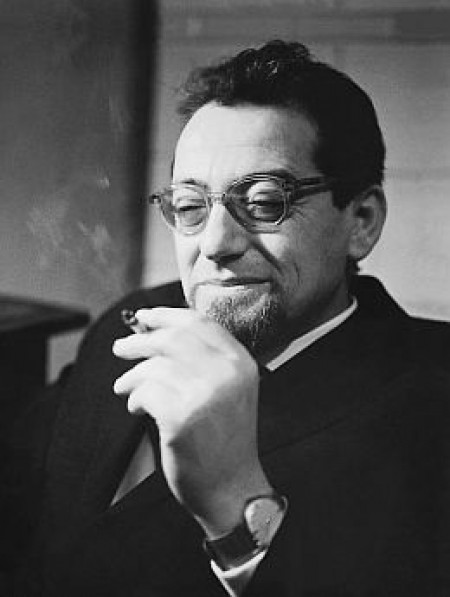
7 November 1917, Budapest – 19 September 1993, Budapest
The composer and conductor, András Mihály, taught for more than four decades at the Music Academy. His charismatic personality had a marked effect on the post-war history of the institution. He was admitted to the cello department of the Music Academy at the age of seventeen, becoming the pupil of Adolf Schiffer, one the most faithful followers of the Popper school. However, chamber music – which he studied under Leo Weiner and Imre Waldbauer, the legendary leader of the Waldbauer quartet - was even more important to him than his main subject. He complemented his Academy studies by taking private lessons in composition and orchestration from Pál Kadosa and István Strasser. From 1941, for five years he directed various workers' choirs, as well as forming his own string quartet, which performed contemporary – by now classic – compositions by Bartók, Schönberg, Berg, Webern, Hindemith and others.
He always attached outstanding importance to propagating modern music – and, within that, 20th century Hungarian works – and having them accepted in the widest possible strata. "The music of our age and the Hungarian audience, as everywhere else in the world, are getting closer to each other" – he said in a 1977 interview. "Naturally, it is necessary to work to promote this. One way of doing this is to smuggle the new music gradually and carefully into the traditional concert repertoire. Strangely enough, this is not only in modern music's interest. The concert repertoire at times gets so tired that it is virtually screaming for new works… The other way of popularising is to depend consciously on the stratum with an express interest in modern music. In Hungary, too, there exists such an audience. Naturally, we are not talking of millions, but there are enough of them to make it worthwhile to care for their interest, to have special modern concerts to please them."
András Mihály, who had a strong left-wing commitment all his life, recalled his experiences in the Buchenwald concentration camp in 1944: "One of the German SS officers must have been a manic music lover. He made it possible for a French violinist, master Ewitt, a professor at the Paris Conservatoire, two Czech musicians and me to play quartets together. We played Haydn, obviously not on a world standard with out hands stiff from breaking stones. Nonetheless: all the horrors, the constant presence of the threat to our lives, all the evil in the camp, disappeared for us in a second when the first notes sounded. Only music can do that." After the war he became the solo cellist of the Opera House, then, from 1948, for two years worked as the secretary-general of the institution, only to return to the Opera House as its director almost thirty years later, in 1978. From 1949 onwards, for more than four decades he taught chamber music at the Academy, helping to launch the careers of several string quartets of international fame.
In the last part of his life he also undertook the direction of the symphony orchestra of the Academy. In 1968 he founded the Budapest Chamber Orchestra, which in the seventies became, besides the New Music Studio, one of the most important workshops of Hungarian composition. In the meanwhile his life's work as a composer also became complete: his oeuvre includes an opera (Together and Alone) and symphonies, as well as concertos, songs and chamber music compositions. He died in Budapest, on 19 September 1993, at the age of seventy-five. At his funeral Sándor Devich said in his farewell speech: "If there is truth in the Aristotelian idea that the ability to teach is the measure of what someone really knows, his life, his life's work is an example of that truth. All of us, his onetime pupils, colleagues, successors, remember him. While teaching, he lent himself to the marvel of forms, melodies, force of expression, the derring-do of the chase, the mildness of the rests, dance, sobbing, laughter, or even praying devotion. He knew that there is nothing more tiring that boredom or meaningless talk, that only a fire can produce smouldering embers, never ashes."
A.R.


